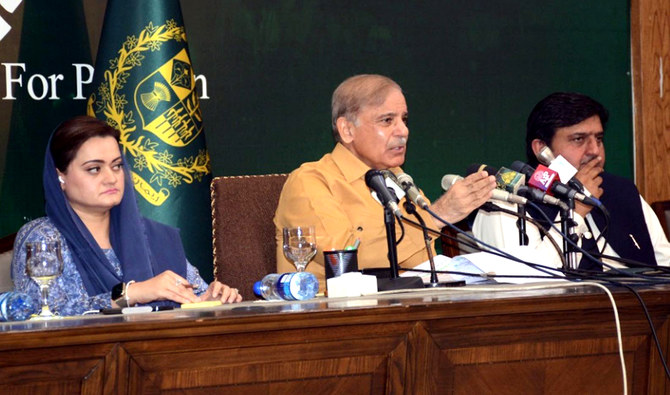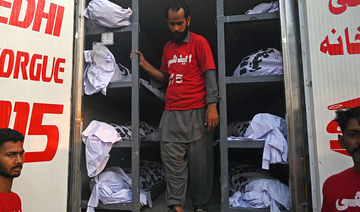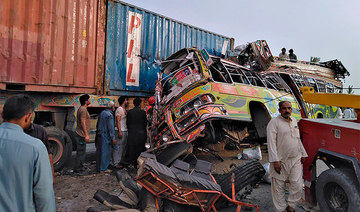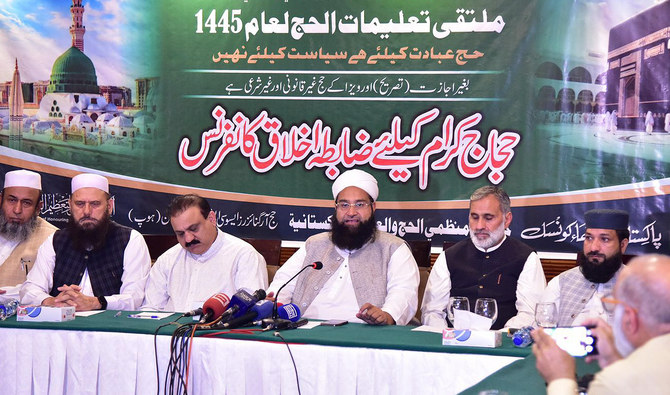ISLAMABAD: Prime Minister Shehbaz Sharif on Saturday urged Chief Justice Umar Ata Bandial to constitute a “full court commission” to probe the allegations made by former premier Imran Khan who survived an apparent assassination attempt while leading an anti-government march to Islamabad and accused three senior government functionaries of masterminding the attack.
Khan held a press talk at the Shaukat Khanum Memorial Cancer Hospital in Lahore, which he built decades ago and where he was being treated for gunshot wounds, on Friday in which he named three people for plotting the attack: PM Sharif, Interior Minister Rana Sanaullah and ISI director-general for counter intelligence, Major General Faisal Naseer.
So far, no evidence has been provided by Khan’s Pakistan Tehreek-e-Insaf (PTI) party to support the accusations.
Addressing a news conference in Islamabad, Sharif said the incident was condemned by everyone and he had personally instructed the interior ministry to provide requisite support to the provincial administration of Punjab to investigate the case.
However, he regretted the “blatant allegations raised yesterday and the day before” by the PTI chief and other leaders while emphasizing the need for a transparent inquiry to determine the truth.
“You are the top judge of the country,” the prime minister said while addressing the Supreme Court chief justice. “I urge you to constitute a full court commission in the best interest of the country to bring the [political] mischief and violence to an end. I will also [formally] request you by writing a letter and I hope you will accept my appeal.”
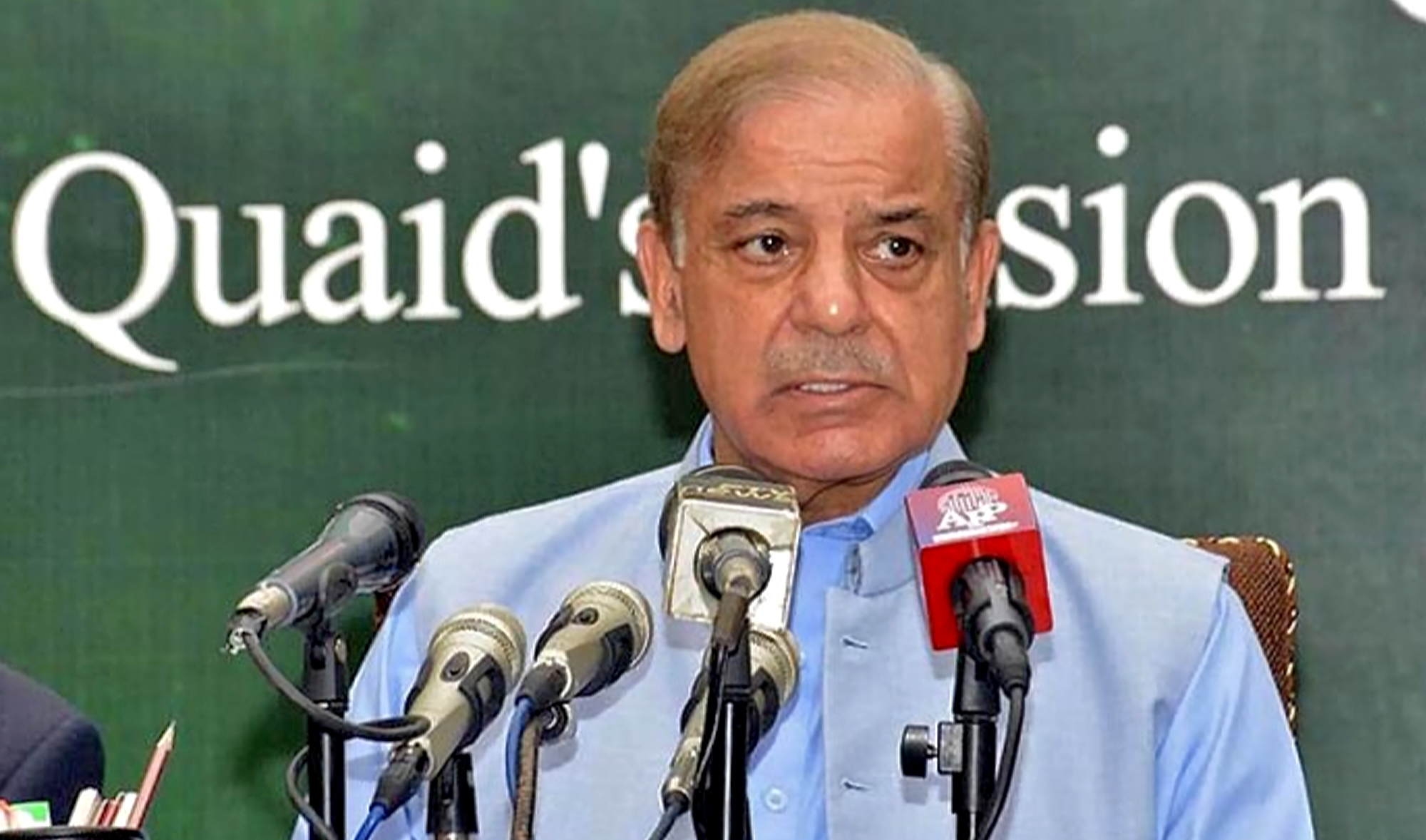
Pakistan Prime Minister Shehbaz Sharif addresses a press conference in Islamabad, Pakistan, on November 5, 2022. (APP)
Sharif said the scales of justice could move in any direction, adding he was not worried about it.
He challenged the PTI chief to bring any evidence to prove his involvement in the assassination attempt while promising not to continue as prime minister of the country, if he was found guilty in the case.
Describing Khan as a “personification of falsehood from head to toe,” the prime minister bitterly criticized him for targeting the country’s military.
“He is attacking the armed forces of Pakistan like an enemy,” Sharif said.
He also maintained that Khan’s PTI party had been running negative social media campaigns against the army and its top officials, adding that its politics had created great deal of excitement in neighboring India.
The prime minister said his government had sent a threat alert to the Punjab government on October 28 which warned that Khan’s rally could be targeted by miscreants.
He also pointed out that the provincial administration belonged to the PTI party and its allies, adding it was their responsibility to provide adequate protection to the anti-government march.
Sharif criticized Khan for not taking medico-legal certificate from a government hospital immediately after the incident.
“Why did he travel for three hours to reach Shaukat Khanum Hospital [after being shot],” he asked. “Why didn’t he stop at some public health facility [to get medical assistance]?”
Senator Azam Swati’s video
Earlier in the day, Federal Investigation Agency (FIA) said a forensic analysis of an “obscene video” of Senator Azam Swati had shown it to be “fake and edited,” as former prime minister Imran Khan’s political party resumed protests in different parts of the country.
The PTI senator had been arrested last month over an anti-army tweet and had allegedly been subjected to custodial torture.
He told the media his wife had received a video featuring him and her, but he did not share further details since he said the “daughters” of his country were also listening to his press talk.
Swati said his wife received the video from an unknown number on Friday night, and the news was broken to him by his daughter.
“I asked her how was it possible,” the senator said while bursting into tears. “I am asking God, is this Pakistan where the sanctity of a husband and wife [is not protected]?”
Hours after social media outrage over the video, the FIA said it had been forensically analyzed and found to be fake.
“Initial forensic analysis revealed that video has been edited and different video clips have been joined with defaced faces,” the agency said in its statement. “Further analysis, revealed that faces have been swapped in the images using photoshop.”
“Prima facie, it is a fake video, edited with deep fake tools to create misunderstanding and defame the Honourable Senator,” it added while requesting Swati to lodge a formal complaint with the FIA to ensure proper investigation.
PTI chief Imran Khan urged the chief justice of Pakistan to take suo motu notice of the incident since it was “shocking, despicable and utterly condemnable.”
“Pakistan was created on Islamic moral values of human dignity, honor of the family and inviolability of chadar and chardawari [privy],” Khan said in a Twitter post. “What has happened to Azam Swati at the hands of the state has been a blatant violation of all these values — from being stripped naked to custodial torture and now this video where the privacy of his wife has been violated.”
Ban on Khan’s live, recorded media talk
Pakistan’s media regulatory authority, PEMRA, also placed a ban on live and recorded speeches and media talks of the PTI chairman on Saturday due to his controversial statements against the army, though the government later instructed the body to reverse its decision.
In a notification to all private television channels, the authority said it “prohibits and rebroadcast of speech(es)/press conferences of Mr. Imran Khan on all satellite TV channels with immediate effect.”
Reacting to the ban, Khan’s party said in a statement the PTI would challenge the “unconstitutional order” in court.
“The ban on Imran Khan’s press conference and speeches is a cowardly,” said the party.
However, information minister Maryam Aurangzeb confirmed the government had invoked Section 5 of the PEMRA Act to lift the ban shortly after its imposition by the authority.
PTI protests
Meanwhile, PTI workers held protests in different parts of the country, including Lahore, Rawalpindi, Peshawar, Faisalabad to express solidarity with Khan who was shot at and wounded in Wazirabad. Main highways and roads were blocked in some areas, causing inconvenience to commuters.
“The assault on Imran Khan is an attack on Pakistan’s security and defense,” PTI lawmaker Gul Zaffar Khan said while addressing protesters in the country’s Bajaur district. “Efforts are underway to create anarchy in Pakistan … Our resolve cannot be deterred through such cowardly acts.”
Protesters in other parts of the country also demanded justice and immediate action against those involved in the assassination plot to kill Khan. The former prime minister urged his supporters to hold daily protests in their respective areas until the alleged plotters were removed from government posts.



